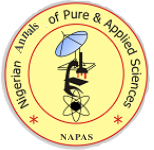Antibiogram of the predominant bacterial contaminants of Nigerian currency notes in circulation in Ogun State, Nigeria
DOI:
Keywords:
Antibiogram, Bacteria contaminants, Currency notes, Ogun StateAbstract
Currency notes can act as a vehicle for the transmission of pathogenic organisms. This study was carried out to determine the antibiotic susceptibility patterns of the predominant bacterial contaminants of Nigerian currency notes in circulation in parts of Ogun State. A total of 240 naira notes of 8 different denominations were collected from various persons into sterile polythene bags, transferred into universal bottles containing 10 mL of sterile buffered peptone water. The notes were removed; the resulting solution incubated overnight and the overnight solution inoculated onto Blood agar, Mannitol salt agar, Eosin Methylene Blue agar and MacConkey agar plates and incubated at 370C for 24 hours. The isolates were then identified by Gram reactions and Biochemical tests and their susceptibility profiles against 8 commonly used antibiotics were determined. A total of 95 out of the 240 samples showed bacterial contamination and the prevalent isolates include: Escherichia coli 31 (32.6 %), Salmonella typhi 26 (27.4 %), Staphylococcus aureus 20 (21.1 %) and Bacillus subtilis 18 (18.9 %) respectively. There was no bacteria growth on the control samples. 52.3 % of the isolates were resistant strains. EC 1 isolate showed the highest susceptibility with an inhibitory zone diameter (IZD) of 25 mm against ciprofloxacin while on the whole, 26.6 % of the isolates were susceptible to all the antibiotics evaluated with 20.9 % showing intermediate susceptibility. This study showed that most of the circulating currency notes harbored one or more bacteria, especially the resistant strains which could pose a severe public health challenge
Downloads
Published
How to Cite
Issue
Section
License
Copyright (c) 2021 MO Akpotu, AF Kehinde

This work is licensed under a Creative Commons Attribution-ShareAlike 4.0 International License.



 Contact Us
Contact Us Editorial Team
Editorial Team Join As A Reviewer
Join As A Reviewer  Request For Print Copy
Request For Print Copy


 Cprint Publishers
Cprint Publishers